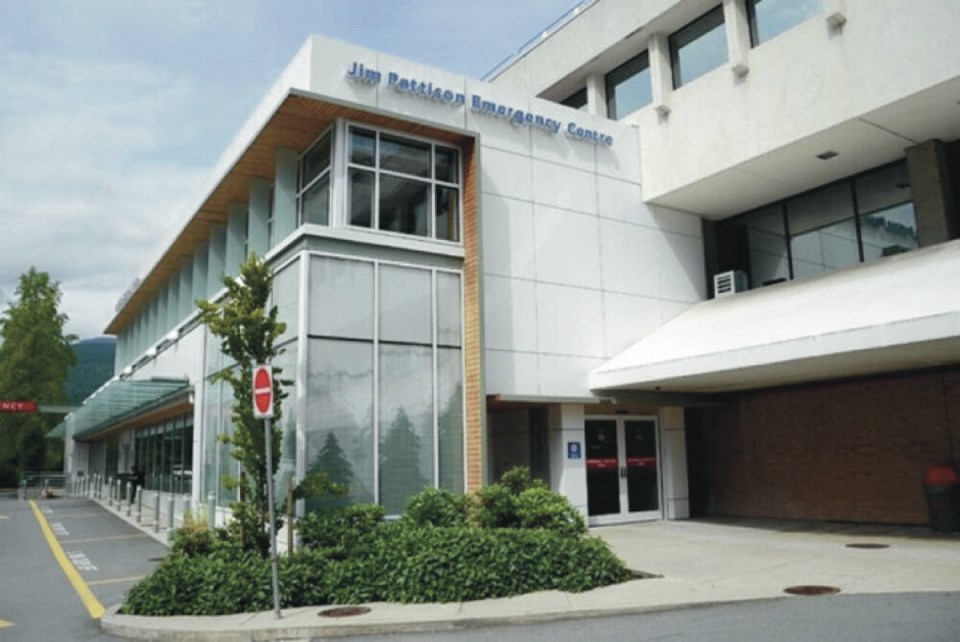An emergency operation centre has been activated at North Vancouver’s Lions Gate Hospital this week, as the province grapples with high numbers of people in hospital due to respiratory illnesses.
Lions Gate is one of 20 hospitals across B.C. where emergency operation centres (EOCs) are expected to be in place for the next six weeks to deal with a surge in hospitalizations.
Hospitals are currently running over 100 per cent capacity, with 10,226 people hospitalized last week in a health care system that has a regular bed capacity of 9,200 beds. Patients are also being cared for in additional temporary hospital beds.
The number of people in hospital is “significant and high” said Health Minister Adrian Dix last week.
Numbers of hospitalizations were higher than usual in December and have also been rising in the first weeks of January, due to a combination of respiratory illnesses including influenza, RSV and COVID-19.
The focus of the emergency operations centres – which are administrative in nature – will be to review hospital bed availability, ensure patients who are ready to be discharged are able to leave hospital promptly and ease emergency department congestion.
Vancouver Coastal Health did not provide any recent occupancy data for Lions Gate Hospital or recent numbers of visits to the hospital’s ER.
In November, the health authority reported a greater than usual number of children were showing up at the LGH ER and the North Shore’s Urgent and Primary Care Centre with respiratory illness. Most illness at that time was caused by the flu. Across the province, six children died of complications of the flu in November and December.
Cases of flu have now peaked and are falling, according to BC’s Centre for Disease Control, but cases of RSV – another respiratory illness – have been increasing, particularly in children.
The pattern is particularly pronounced among children and teens in Vancouver, Richmond and the North Shore, according to the BCCDC where, “RSV has replaced influenza as the most commonly detected virus.”
COVID-19 infections have also been slowly increasing in the past two weeks. According to data collected from the Lions Gate sewage plant on the North Shore, infection levels have been creeping up since just before Christmas, with amounts of the virus detected per litre of wastewater tripling in that time frame, from 13,580 copies per litre on Dec. 24 to 46,880 copies per litre detected on Jan. 2.
Most recently, the latest subvariant of COVID-19, XBB.1.5 ¬– also known as Kraken – has also been detected in B.C.
The variant, which is rapidly becoming the dominant strain of the virus in the U.S., is believed to be more transmissible than Omicron and better able to slip past existing COVID-19 immunity. As of Jan. 4, 12 cases of Kraken had been detected in B.C., according to the BCCDC, but that was expected to grow.
Noting that the health care system is approaching its fourth year of dealing with the pandemic, Dix urged those who have not yet had their booster doses of COVID-19 vaccination to get the shot.
Data from the BCCDC shows that among adults aged 18 to 49 on the North Shore, between 89 and 94 per cent have received two doses of the vaccine, but that number drops to between 55 and 64 per cent for third doses and to between 21 and 30 per cent for fourth doses. As of Jan. 4, only between 10 and 16 per cent of children under five on the North Shore had received two doses of vaccine while among kids five to 11 years old, between 52 and 63 per cent had received two doses.
At the beginning of December, the Ministry of Health said 16 per cent of kids aged six months to four years old had received flu vaccine in West Vancouver, while 22 per cent had received the jab in North Vancouver. Among children and teens aged five to 17, those flu vaccination rates were 20 per cent and 25 per cent respectively.



